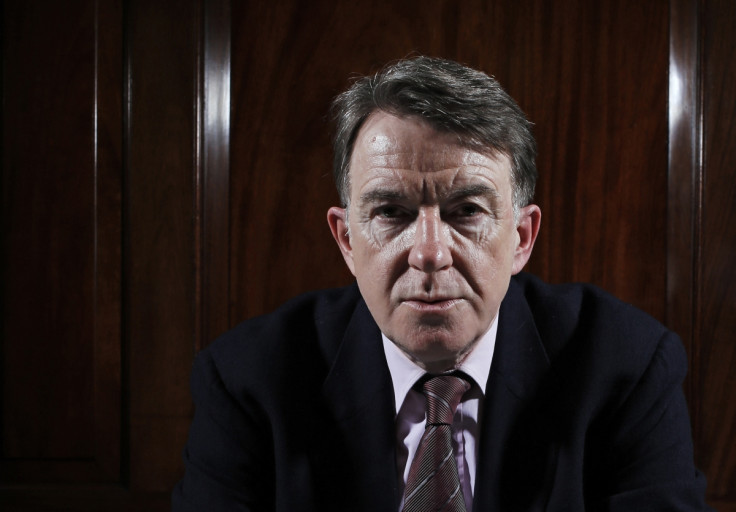Peter Mandelson: Don't Exaggerate Importance of Ukip's EU Elections Victory

A senior Labour peer is urging politicians not to overstate the significance of Ukip's victory in the European Parliament elections.
Peter Mandelson, a Labour lord who served in the cabinet and as the EU commissioner for trade, said political supporters of the EU and the free movement of workers must justify their policies in the face of a eurosceptic onslaught.
There is a debate among both Labour and the Conservatives about how best to win back support from Ukip after it beat them to first place in the EU parliament elections. Ukip took 27.5% of the vote, Labour 25.4% and the Conservatives 23.9%.
Some people in both parties are suggesting a policy shift towards right-wing Ukip, which wants to pull the UK out of the 28-member state EU and end most immigration from the continent, by promising to get tougher on Brussels and immigration.
David Cameron, leader of the Conservatives, has already pledged an in/out referendum on the UK's membership of the EU in 2017 if his party wins the forthcoming general election.
"You saw some electoral insurgency against the mainstream parties. I thought the message was a plague on everyone's houses," Mandelson told IBTimes UK at a conference in London held by the thinktank Policy Network.
"But I wouldn't exaggerate the importance of it. Remember that the vote that Ukip received represented just 9% of the British electorate.
"And many of those who voted for Ukip, when questioned subsequently, said they neither liked nor agreed with Ukip. So I think that gives a reasonable idea of the importance of the vote. I don't dismiss it. But nor am I running away with any false ideas about its importance."
Justify
Despite playing down the significance of Ukip's electoral win, which mirrored a sharp increase in the eurosceptic and anti-immigration vote elsewhere on the continent, Mandelson said that "you can't ignore it".
"You've got to be sensitive. You've got to justify your policies. You shouldn't just brush it aside," he said.
"I think Europe has in a sense become a metaphor, a code word, for people's anger, their disappointment and their insecurity."
Tony Blair, the former Labour prime minister in whose cabinet Mandelson served, has said the party's current leader Ed Miliband must take the fight to Ukip by making the case for the EU and immigration rather than shift policy towards Nigel Farage's party.
Cameron
Mandelson also took a swing at Cameron's attempt to reform the EU, which he puts down as motivated by party political squabbling.
Though pledging a referendum, Cameron insists he wants to remain in a reformed EU that is more focused on deepening the single market than centralising political power in Brussels.
"My concern is that his interest is less in reforming the EU than bridging the divide within the Conservative party," said Mandelson, who is chairman of constultancy firm Global Counsel.
"I think if he were more demonstrably interested in the future of the EU, and how it's going to become more effective, people on the continent would listen to him more.
"Britain has a very important voice and role to play in securing reform, but we've got to demonstrate that we're committed to the EU, the European project, to get people to listen to us."
There are many eurosceptics on Cameron's backbenches. His promise of a referendum was a means of taking the pressure off of his leadership of the party. Critics from his own House of Commons benches felt he was not far enough on the right politically when it came to the EU.
Labour has refused to match the Tories' referendum promise. But the party has said it would hold an in/out referendum if any new EU treaty sought to transfer more sovereignty from Westminster to Brussels.
"There is a risk, if there is a referendum, of the vote going the wrong way," Mandelson said.
"I've said before, a referendum is a type of lottery. You literally can't tell what result's going to be pulled out of the box. It depends on what's happening that day, how people are feeling, how they regard the government, what they're unhappy about, as much as it does on the EU."
© Copyright IBTimes 2025. All rights reserved.






















